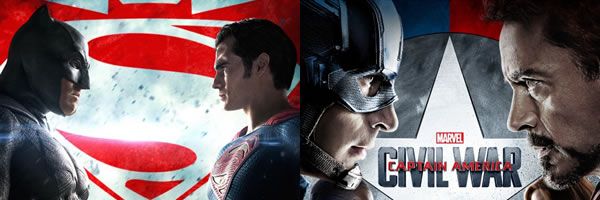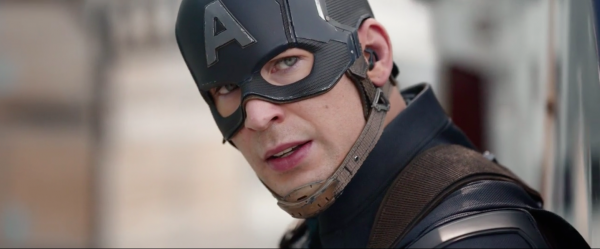For a brief moment, there was a time when Batman v Superman: Dawn of Justice and Captain America: Civil War were both supposed to open on May 6, 2016. It was going to be the ultimate showdown between the Marvel and the DC faithful, as if ticket-buyers were restricted from seeing both movies that weekend (if anything, it would have been a test of general audiences). But Warner Bros. blinked, scooted up to March, and did quite well on its opening weekend, although its real test will be if it can do well at the box office in the weeks ahead, especially when you consider it has zero competition from another blockbuster until The Jungle Book opens on April 15th.
But the film will inevitably be judged against Civil War even though there are other superhero movies on the docket for 2016 (there will also be a fresh round of comparisons in August with Suicide Squad, the first DCEU movie not directed by Zack Snyder), and it will be a fair comparison. Not only have DC and Marvel been rivals in the comics space for decades, it’s only fair that rivalry would spill over into films, especially once Warner Bros. wanted to rush to an Avengers-style model and throw their two biggest heroes against each other. To put it another way, it would be unusual to compare Civil War to a straight Man of Steel sequel that only featured Superman, just as I’m sure it will be a little odd to do a straight comparison of Batman v Superman to Doctor Strange.
What makes Batman v Superman and Civil War such a fascinating pair is that they’re movies where superheroes fight each other rather than traditional antagonists. Once Civil War opens, I’m sure we’ll get more detailed thinkpieces about what this means for superhero cinema (even though this year will bring us some diversity with Deadpool, Suicide Squad, and Doctor Strange, these two movies get a huge say on the entire genre because of their size and scope) as well as the state of American culture and politics (art is, after all, a reflection of our culture and history).
However, Marvel doesn’t seem worried about trying to draw audiences to the same movie twice. This isn’t a situation like Volcano/Dante’s Peak, Deep Impact/Armageddon, or Snow White and the Huntsman/Mirror Mirror. Warner Bros. doesn’t “win” just by being first, and as we can see from the marketing campaigns, Marvel doesn’t want to rest its entire film on being “the other one where the heroes punch each other.” These are two different films, and while geeks have no problem telling the difference, every movie has to reach beyond its core demographic in order for it to be a hit.
Based on the trailers for the two movies, even though both could be viewed as “dark”, there are different kinds of darkness. Let’s look at the three main trailers for Batman v Superman:
The first teaser hits on a sense of dread; Alfred mentions how good men are turned cruel, and Batman tells Superman that he will bleed. It’s…intense.
The first full trailer starts out on a bit of a lighter note as Jesse Eisenberg’s Lex Luthor manic performance brings a little levity to the proceedings, but then things get intense again as the fight ramps up, Alfred talks about a fight against Superman being “suicide”, Superman saying he could kill Batman if he wanted to, and then there’s lots of breaking stuff (although there’s no shortage of destruction in a trailer for any blockbuster movie), but you do get the “hero shot” of Superman, Batman, and Wonder Woman standing together.
The final trailer is all about the action with a bit of humor sprinkled in from the Bruce/Alfred dynamic and a little bit of Wonder Woman’s charm. You’ll also note that the closest any of these trailers come to showing daylight is the destruction in Metropolis from Man of Steel. There’s no daylight anywhere else. It’s dark, it’s overcast, it’s rainy, but there’s nothing to show sunlight. It’s a movie that promises to be visually dark, action packed, and have its characters deal with grim sentiments (although the trailers don’t scratch the surface of how grim the film ended up being).
Now let’s compare that to what we’ve seen so far from the trailers for Civil War, which are definitely dark, albeit in a very different way. All of the darkness in the Civil War trailers comes from a sense of loss and melancholy as opposed to Batman v Superman’s angry bombast.
While there’s definitely talk about threats in the abstract, there’s also talk about personal details like how Steve used to wear newspapers in his shoes. We also get mentions of personal relationships like how much Bucky means to Steve, and how Steve and Tony used to be friends. You can also see that this movie does not hide from the sun like a vampire.
The second trailer talks about trying to save people, but not being able to save everyone, and yet never giving up regardless. Again, it’s a melancholy tone that’s dark, but not in the same way as Batman v Superman. And all of it carries character weight. It’s not “Look! These characters are on the screen together!” We’ve done that before. It’s that these character relationships—which took time to set up—are changing. You’re supposed to get a thrill when Cap says, “I could do this all day,” because you liked him over the course of Captain America: The First Avenger, The Avengers, Captain America: The Winter Soldier, and Avengers: Age of Ultron.
What Civil War has going for it is that the audience is already invested in these characters. That’s not to say the movie is going to work. It could be a total disaster. The film could suffer from having too many characters. Audiences may not like their heroes fighting each other instead of fighting a common enemy. Maybe Age of Ultron left a sour taste in their mouth (keep in mind that general audiences don’t follow who’s writing and directing, especially when Marvel makes sure the brand is the biggest star of all).
But the upside to constructing your cinematic universe like a television show is that people want to know what happens in the next episode, and while this episode may bear some brief resemblance to something that just aired, there’s no mistaking the Marvel universe for Batman v Superman. Audiences know that come May 6th, they’re going to get something very different, even if that means it’s dark in a way that means melancholy instead of bitter and angry.
Additionally, while there will be The Jungle Book to fill in some blockbuster space for April, by the time May 6th rolls around, that’s when the true blockbuster season begins with kids itching to get out of school and the non-stop barrage of blockbuster movies coming week after week. I look forward to comparing Civil War and Batman v Superman, but I think it’s fair to say that it won’t be like seeing the same film twice.


